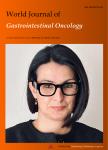Emerging evidence of the molecular landscape specific for hematogenous metastasis from gastric cancer
Emerging evidence of the molecular landscape specific for hematogenous metastasis from gastric cancer作者机构:Department of Gastroenterological Surgery(Surgery Ⅱ)Nagoya University Graduate School of MedicineNagoya 466-8550Japan
出 版 物:《World Journal of Gastrointestinal Oncology》 (世界胃肠肿瘤学杂志(英文版)(电子版))
年 卷 期:2018年第10卷第6期
页 面:124-136页
核心收录:
学科分类:10[医学]
主 题:Gastric cancer Hematogenous metastasis Hepatic metastasis Molecular mechanism Biomarker Premetastatic niche
摘 要:Gastric cancer(GC) is one of the most frequentlydiagnosed cancers in the world. Most GC patients are diagnosed when the cancer is in an advanced stage, and consequently, some develop metastatic lesions that generally cause cancer-related death. Metastasis establishment is affected by various conditions, such as tumor location, hemodynamics and organotropism. While digestive cancers may share a primary site, certain cases develop hematogenous metastasis with the absence of peritoneal metastasis, and vice versa. Numerous studies have revealed the clinicopathological risk factors for hematogenous metastasis from GC, such as vascular invasion, advanced age, differentiation, Borrmann type 1 or 2 and expansive growth. Recently, molecular mechanisms that contribute to metastatic site determination have been elucidated by advanced molecular biological techniques. Investigating the molecules that specifically participate in metastasis establishment in distinct secondary organs will lead to the development of novel biomarkers for patient stratification according to their metastatic risk and strategies for preventing and treating distinct metastases. We reviewed articles related to the molecular landscape of hematogenous metastasis from GC.



